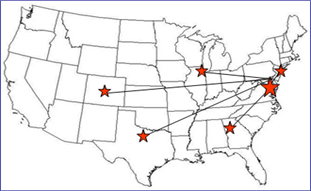- Home
- Who Is Involved in the Effective Health Care Program
- About the Regional Partnership Development Offices
About the Regional Partnership Development Offices
AHRQ is building a national partnership network dedicated to promoting patient-centered outcomes research in patient and professional communities across the United States.
The Regional Partnership Development Offices develop partnerships with local, State, and regional organizations to promote Effective Health Care (EHC) Program research findings relevant to each region’s priority populations and public health needs. Partner organizations serve as liaisons between AHRQ and the organization’s members or constituency.
These partnerships enhance awareness, understanding, and use of the EHC Program’s patient-centered outcomes research by organizations representing patients and consumers, health care providers and systems, and businesses.
The Regions
AHRQ’s Regional Offices are pursuing sustainable partnerships in all 50 States, Washington, DC, and the U.S. territories through offices in Atlanta, Chicago, Dallas, Denver, and New York, with headquarters in Washington, DC. Each Regional Office encompasses the following States and territories:
- Atlanta: Alabama, Delaware, District of Columbia, Florida, Georgia, Kentucky, Maryland, Mississippi, North Carolina, Pennsylvania, South Carolina, Tennessee, Virginia, and West Virginia
- Chicago: Illinois, Indiana, Iowa, Kansas, Michigan, Minnesota, Missouri, Nebraska, Ohio, and Wisconsin
- Dallas: Arizona, Arkansas, California, Hawaii, Louisiana, Nevada, New Mexico, Oklahoma, Texas, American Samoa, Commonwealth of the Northern Mariana Islands, Federated States of Micronesia, Guam, and Republic of Palau
- Denver: Alaska, Colorado, Idaho, Montana, North Dakota, Oregon, South Dakota, Utah, Washington, and Wyoming
- New York: Connecticut, Maine, Massachusetts, New Hampshire, New Jersey, New York, Rhode Island, Vermont, Puerto Rico, and the Virgin Islands
Each Regional Office establishes and maintains partnerships with organizations representing health care providers, systems, businesses, unions, and consumers. Prospective partners were initially identified through research in local communities, input from expert panels, and referrals from other partner organizations.
Regional Expert Panels
Regional expert panels help the Regional Offices identify and engage potential partners and their constituents by addressing distinct geographic or population-specific characteristics and needs. Each region has an expert panel comprised of a diverse group of 10–15 individuals involved with health care issues in their communities.
Partnership Activities
Partnership activities meet the needs of each individual partner organization. Activities are designed to educate clinicians and consumers about patient-centered outcomes research and to encourage the use of EHC Program materials in shared decisionmaking and practice. The Regional Offices work with partners to share the following:
- EHC Program guides, research reviews, and other materials, which can be shared with members or patients electronically, ordered in bulk for free, or placed in partner organizations’ literature/newsletters
- Links to the EHC Program Web site and other educational resources, such as videos, podcasts, and Web conferences
- Continuing medical education/continuing education (CME/CE) programs announced via Web site widgets and banners
- Opportunities to participate in the research process
To find out more about becoming a partner, please email EHC_outreach@ahrq.hhs.gov.
A Coordinated Effort in Translation, Dissemination, and Implementation
To complement the evidence translation and dissemination efforts undertaken by the John M. Eisenberg Center for Clinical Decisions and Communications Science, funds from the American Recovery and Reinvestment Act are supporting four dissemination and implementation projects from September 2010 to September 2013: The National Initiative for Promoting Evidence-Based Health Information, Regional Partnership Development Offices, Online Continuing Education, and Academic Detailing. In addition, a separate Systematic Dissemination Program Evaluation project not only develops metrics and collects data for measuring the impact of each project, but also provides continuous feedback for ongoing project improvements. The Regional Partnership Development Offices contract was awarded to Ogilvy Public Relations.
Building on the translation products developed by the Eisenberg Center, these projects enhance the Effective Health Care Program’s capacity to promote the use of evidence-based health information and improve health care outcomes. Target audiences include consumers, patients, and caregivers; individual clinicians and their professional organizations; hospitals and integrated health systems; businesses and business organizations; academicians and researchers; Quality Improvement Organizations; policymakers; and advocates for better patient care. Special emphasis is placed on reaching priority populations, including minorities, seniors, low-income individuals, and people with limited access to health care.
Related Content
- February 6, 2013
- About the Eisenberg Center


 E-mail Updates
E-mail Updates